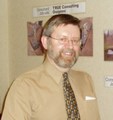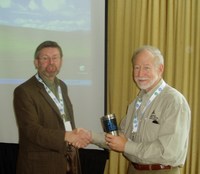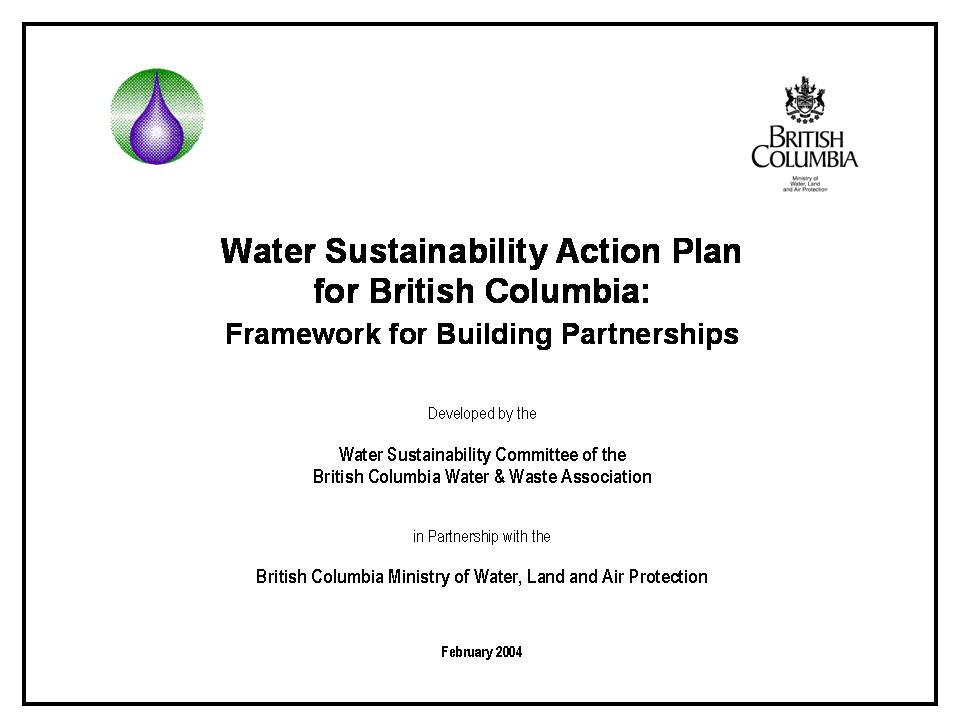Showcasing the Water Sustainability Action Plan
American visitors impressed by what BCWWA is doing to create change in British Columbia
 When the British Columbia Water & Waste Association (BCWWA) hosted a regional meeting of the American Water Works Association (AWWA) in September 2006, the accomplishments of the Water Sustainability Committee were highlighted. The meeting was held at the Marriott Hotel in downtown Vancouver, and was attended by Section Officers from the Western Provinces, Alaska, and states throughout the Pacific Northwest.
When the British Columbia Water & Waste Association (BCWWA) hosted a regional meeting of the American Water Works Association (AWWA) in September 2006, the accomplishments of the Water Sustainability Committee were highlighted. The meeting was held at the Marriott Hotel in downtown Vancouver, and was attended by Section Officers from the Western Provinces, Alaska, and states throughout the Pacific Northwest.
Convening for Action
 Kim Stephens, Program Coordinator for the Water Sustainability Action Plan for British Columbia, provided an overview of how the Water Sustainability Committee is facilitating change through collaboration and partnerships with a range of organizations that have an interest in the Action Plan, and especially through a partnership with the Province of British Columbia.
Kim Stephens, Program Coordinator for the Water Sustainability Action Plan for British Columbia, provided an overview of how the Water Sustainability Committee is facilitating change through collaboration and partnerships with a range of organizations that have an interest in the Action Plan, and especially through a partnership with the Province of British Columbia.
According to Phil Wong, BCWWA Past-President, “We suggested that a presentation by Kim Stephens be included on the agenda because we believe that our American counterparts can learn from our British Columbia experience in building broadbased partnerships and in convening for action, and in working in areas of sustainability that are outside traditional engineering infrastructure.”
Teachable and Reachable Moments
 Stephens opened his presentation by talking about teachable and reachable moments: “Timing is everything. Drought, forest fires and floods in 2003 created a teachable moment for change that resulted in the Action Plan. We had the public’s attention,” he stated. “Teachable moments result from things that happen. To create long-term change, however, requires reachable moments when people open their minds and are receptive to new ways of doing things. A teachable moment can set the stage for a reachable moment,” Stephens added.
Stephens opened his presentation by talking about teachable and reachable moments: “Timing is everything. Drought, forest fires and floods in 2003 created a teachable moment for change that resulted in the Action Plan. We had the public’s attention,” he stated. “Teachable moments result from things that happen. To create long-term change, however, requires reachable moments when people open their minds and are receptive to new ways of doing things. A teachable moment can set the stage for a reachable moment,” Stephens added.
Water-Centric Planning
He then went on to explain how the Action Plan provides a partnership umbrella for an array of on-the-ground initiatives that promote a ‘water-centric’ approach to community planning.”Water-centric planning means we will plan with a view to water – whether we are planning for a site, a region, or the Province. We have adopted the term water-centric to make the point that land use and water use go hand in hand. The way we develop land determines how water is used, and how water runs off the land,” explained Stephens.
Stephens painted a broadbrush picture of how change is being advanced on the ground in British Columbia through four partnerships in particular: Convening for Action, the WaterBucket Website Partnership, the Water Balance Model Partnership, and the Green Infrastructure Partnership.
“The WaterBucket is the recognized water portal for the province. It is a resource-rich destination location for timely and provocative information,” observed Stephens when he showed a video about the website. The video is found on the entry page to the website.
Build a Vision, Create a Legacy
Stephens concluded his presentation by pointing out that how we choose to accommodate settlement pressures will ultimately determine whether we sustain community livability: “The first question you have to ask yourself is this – what do you want this place to look like in 20 years, in 50 years? The second question to ask yourself is what I am already doing to achieve this outcome? Once you have reflected on that, the third and final question to ask yourself is what am I going to do better or differently to get from here to there?”
“Kim’s presentation struck a chord”, reports Phil Wong, “Without any prompting from me, Gary Sullivan (on the right in the photo opposite) of the  AWWA headquarters staff said that he will be arranging for a link to WaterBucket on AWWA’s website. Afterwards, another AWWA staffer came up to me and increduously asked ‘How do you get people to think like that?’ In addition, another of our American colleagues at the meeting suggested that the accomplishments of the Water Sustainabilty Committee would be an excellent candidate for an AWWA award, either the Public Communications Achievement Award or a Section Education Award.”
AWWA headquarters staff said that he will be arranging for a link to WaterBucket on AWWA’s website. Afterwards, another AWWA staffer came up to me and increduously asked ‘How do you get people to think like that?’ In addition, another of our American colleagues at the meeting suggested that the accomplishments of the Water Sustainabilty Committee would be an excellent candidate for an AWWA award, either the Public Communications Achievement Award or a Section Education Award.”
To Learn More:
To download a copy of the presentation by Kim Stephens, click on this link to Convening for Action in British Columbia: Water – Choosing Sustainability for Life & Livelihoods.





